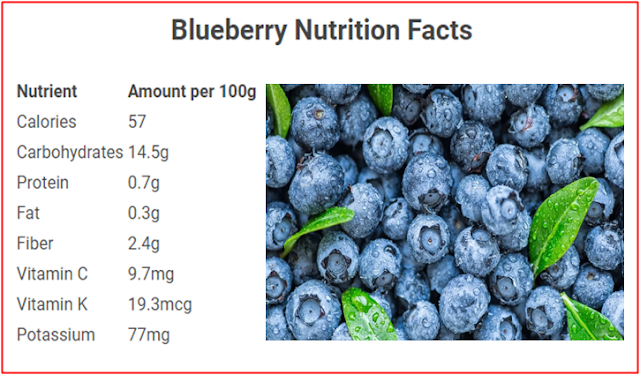Ideberries.com - Blueberries are small, round berries that are not only delicious but also packed with a wide range of nutrients.
These vibrant blue fruits are known for their sweet and tangy flavor, making them a popular choice in various dishes and desserts.
Beyond their taste, blueberries offer several health benefits due to their rich nutritional profile.
Blueberries are a great source of vitamins and minerals. They are particularly high in vitamin C, which is essential for boosting the immune system and promoting healthy skin.
Additionally, blueberries contain vitamin K, which plays a crucial role in blood clotting and bone health. They also provide smaller amounts of vitamins such as vitamin E, vitamin B6, and folate.
Blueberries are loaded with antioxidants, which are compounds that help protect our cells from damage caused by harmful molecules called free radicals.
The primary antioxidants found in blueberries are anthocyanins, responsible for the fruit's vibrant blue color.
These antioxidants have been linked to numerous health benefits, including reducing the risk of chronic diseases like heart disease, cancer, and age-related cognitive decline.
Another notable nutrient in blueberries is dietary fiber. Fiber is important for maintaining a healthy digestive system and promoting regular bowel movements.
Blueberries contain both soluble and insoluble fiber, which can help lower cholesterol levels, regulate blood sugar levels, and aid in weight management.
In addition to the above nutrients, blueberries are low in calories and fat, making them an excellent choice for those watching their weight.
They also have a low glycemic index, meaning they have a minimal impact on blood sugar levels, making them suitable for individuals with diabetes or those aiming to control their blood sugar.
Blueberries are rich in minerals such as manganese and potassium. Manganese is essential for the metabolism of carbohydrates, proteins, and cholesterol, while potassium plays a vital role in maintaining proper heart and muscle function.
Blueberry Nutrition Facts
| Nutrient | Amount per 100g |
|---|---|
| Calories | 57 |
| Carbohydrates | 14.5g |
| Protein | 0.7g |
| Fat | 0.3g |
| Fiber | 2.4g |
| Vitamin C | 9.7mg |
| Vitamin K | 19.3mcg |
| Potassium | 77mg |
The Science of Blueberries: Understanding the Nutritional Composition
Blueberries are not only a delicious and versatile fruit but also a nutritional powerhouse. Their vibrant color and distinct flavor are indicative of the wealth of nutrients they contain.
We will explore the science behind blueberries' nutritional composition, highlighting the key vitamins, minerals, antioxidants, and other beneficial compounds that make them a valuable addition to a healthy diet.
A Bounty of Vitamins:
Blueberries are rich in various vitamins essential for our overall well-being. Vitamin C, a potent antioxidant, helps boost our immune system and promotes healthy skin.
Vitamin K is crucial for blood clotting and bone health, while vitamin E supports cellular function and acts as a powerful antioxidant. We'll delve into the specific roles of these vitamins and how blueberries contribute to our daily intake.
Antioxidant Powerhouse:
Blueberries are renowned for their high antioxidant content, particularly anthocyanins, the pigments responsible for their vivid blue color.
These antioxidants help protect our cells from damage caused by harmful free radicals, potentially reducing the risk of chronic diseases such as heart disease, cancer, and neurodegenerative disorders. We'll explore the antioxidant potential of blueberries and their impact on our health.
Fiber for Digestive Health:
Dietary fiber is essential for a healthy digestive system, and blueberries offer a good amount of both soluble and insoluble fiber.
We'll discuss how fiber aids in digestion, regulates bowel movements, and contributes to a healthy gut microbiome.
Moreover, we'll examine the impact of blueberries' fiber content on cholesterol levels, blood sugar regulation, and weight management.
Mineral Marvels:
Blueberries are a source of vital minerals like manganese and potassium. Manganese plays a key role in metabolism, while potassium is essential for proper heart and muscle function.
We'll explore how these minerals contribute to our overall health and the potential benefits of incorporating blueberries into our diet to meet our mineral requirements.
Beyond Nutrients: Exploring Phytochemicals:
Blueberries are not just rich in vitamins and minerals; they also contain an array of phytochemicals, which are plant compounds with potential health benefits.
We'll discuss phytochemicals such as resveratrol, quercetin, and pterostilbene found in blueberries and their potential roles in disease prevention and overall well-being.
Understanding the nutritional composition of blueberries reveals the multitude of health benefits these small berries offer.
From vitamins and minerals to antioxidants and phytochemicals, blueberries provide a diverse range of nutrients that support our immune system, protect against oxidative stress, aid digestion, and promote overall health.
Incorporating blueberries into your diet is easy. You can enjoy them on their own as a snack, add them to smoothies, oatmeal, yogurt, or salads, or use them in baking for a healthier twist.
Aim for a variety of colorful fruits and vegetables in your diet to maximize the nutritional benefits.
Remember, while blueberries are a nutritious choice, it's essential to maintain a balanced diet and engage in regular physical activity for overall health and well-being.


